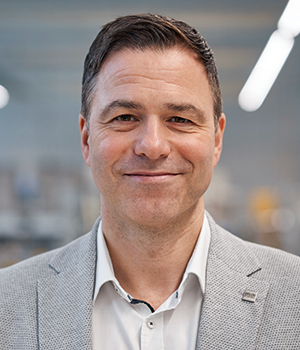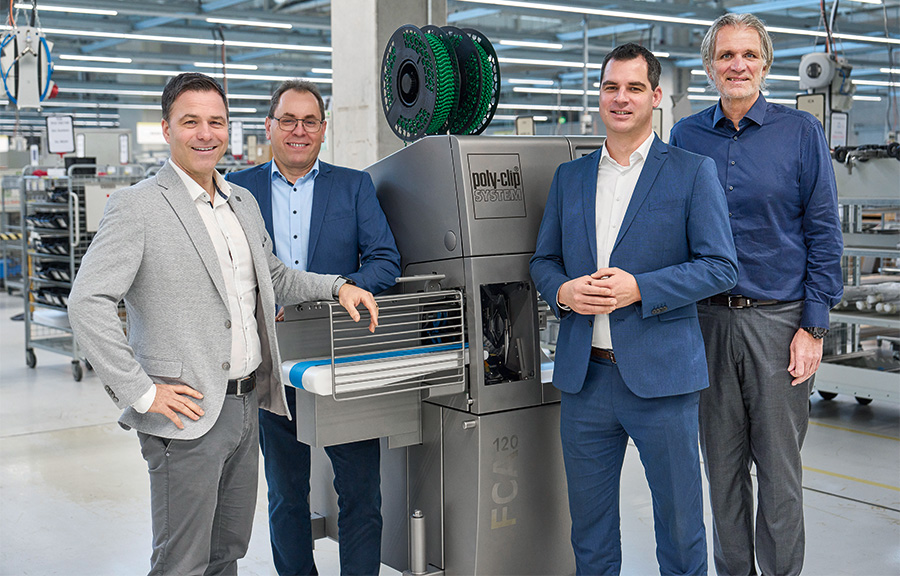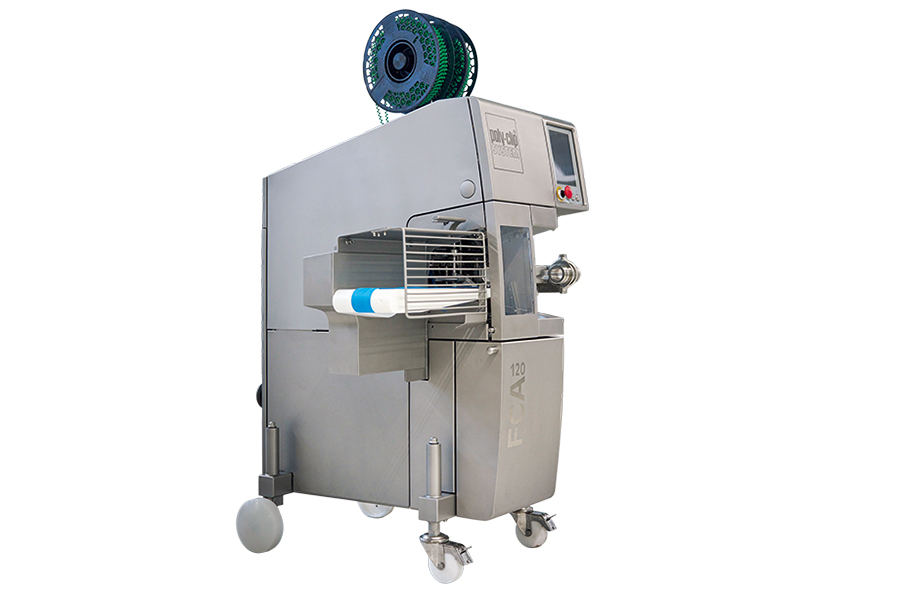Text Meinolf Droege ––– Photography
Many people are familiar with the protective packaging often used on sausages – a clip made of aluminium at either end keeps out contaminants and gives the sausage a reliable and long shelf life. Once the sausage has been used up, the tiny amount of waste – the sleeve and clips – disappears with the rest of the household rubbish. This system is now standard for many products – not just for sausages, as it was originally designed for, but also for butter packaging and ready meals, and even for applications in the chemical industry.
Poly-clip System, which has two sites in the German region of Hesse – Hattersheim and Gedern – is a global leader in this packaging technology. The family business develops and manufactures packaging machines for a whole host of products, as well as packaging sleeves and clips – and it has plenty of ideas for making packaging more efficient, too. Its market-leading position and 90 percent export rate speak volumes about the company’s excellent performance and innovative capabilities. Over the past 15 years in particular, there has been a stronger focus on the sustainability of products and production. CEO Dr. Alexander Giehl explains how he is aiming to strengthen the company further still by steering a clear course in a competitive market – and the role LKH plays in this.
Dr. Giehl, what is it that makes Poly-clip System a hidden champion?
We are a family business with roots that stretch back 100 years. In a list of SMEs with the strongest growth, we are currently ranked 19th out of the 8,000 companies assessed. What’s more, “Handelsblatt” has named us a Top 100 innovator. We are continuously growing worldwide – and that growth will continue, because cost pressures and waste legislation mean our packaging technology is appealing to more and more users.
Why is your clip-pak® packaging solution – a tubular bag that is closed with a clip at both ends – attracting so much interest on the market?
This solution keeps packaging material to a minimum and yet provides bacteria-proof protection for foods. What’s more, it shapes and packages the product in one step. There’s no air in the packaging and we can produce whatever size is needed. Users only need one material and one machine. With conventional tray packaging solutions, such as for minced meat, you need films and foamed materials, as well as gas flushing, dispensing and packaging equipment. Another benefit of our clip-pak® solution is that the logistics are so much cheaper. The packaging is rolled up tightly, so it takes up very little space during transportation and storage, and it only expands when it’s filled. These are some of the reasons why our technology is not only economical, but very sustainable, too. Compared to trays, the carbon footprint of our solution is around 80 percent smaller – and we’re continuously shrinking that further still, thanks to new developments.
Can the same be said of your spool technology?
Our spools of clips are a very good example. The clips for the packaging machines are delivered to customers on these spools. The spools are then mounted onto the machines and the clips are fed into the machines from there. They’re actually a disposable product, with around 2.5 million of them produced each year. However, they’re also an excellent example of how innovation can lead to sustainability. Our partner LKH has been producing these spools since 2007. That was also when the material used to make them was switched from virgin material to 100 percent recycled material – resulting in savings of 1,400 metric tons of new plastic each year. A return system has also been set up – once their spools are empty, customers can return them, and LKH arranges for them to be recycled. In 2009, LKH suggested developing a more economical, more energy-efficient stack mould – an idea that they then turned into reality. Since then, repeated reviews have been carried out to see whether and how this product can be further improved. We’re talking big numbers, too – more than 35 million spools have now been produced.
What other development steps have been taken since then?
Earlier versions of the spools contained aluminium components. However, these have been replaced by a mono-material solution that simplifies production and logistics. LKH and Poly-clip System also worked together to develop an ingenious honeycomb structure instead of the solid design – and a switch was made to a hot-runner mould, too. This reduces the amount of material used by 30 percent, while nevertheless making the spools very robust. Together with LKH, we are currently focusing once more on materials, with a view to making further progress in relation to sustainability.
What are the defining features of your successful collaboration with LKH?
LKH isn’t your typical contractor. They’re very proactive about regularly proposing new ideas along the entire process chain – in other words, in relation to choice of materials, toolmaking, production and logistics. The teams from Poly-clip System and LKH get together at least once a year to share ideas. The long-standing collaboration is extremely straightforward, constructive and based on a high level of trust. It’s a lot of fun, too – and that’s also why LKH is our sole supplier. We’re not just a good match in technical terms – we have very similar philosophies, too. We think in the longer term, use the very latest technologies and, even when focusing on the details, never lose sight of what we want the overall solution to look like in the end.


